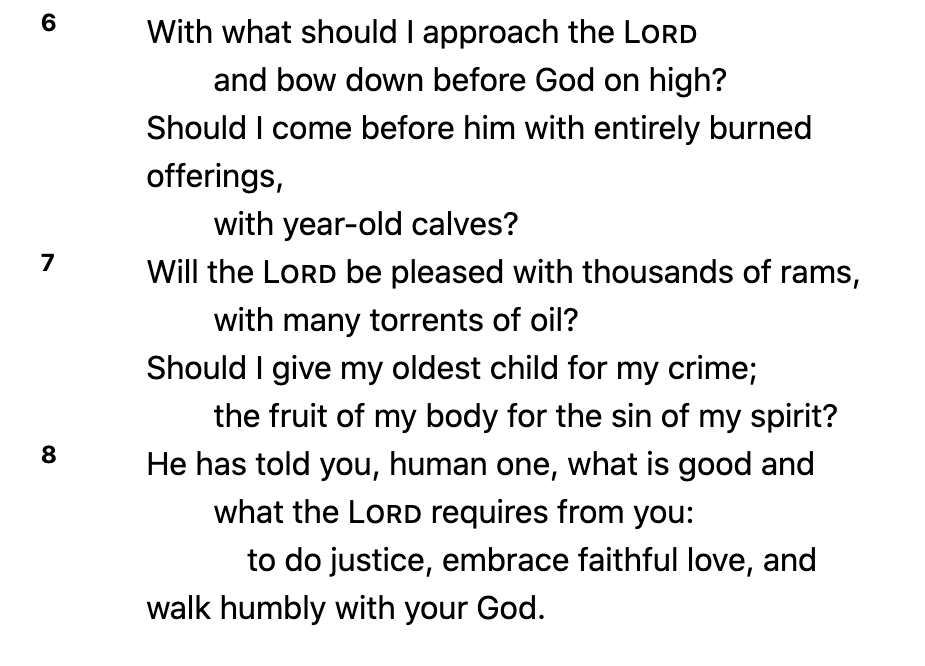Justice, Mercy, Humility

Micah was a prophet during the early years of the Assyrian threat to the Northern Kingdom of Israel, about the years 720-700 BCE. Micah preached in the Southern Kingdom of Judah, but he foresaw the coming calamity to the Northern Kingdom, and he sought that the Southern Kingdom repent and turn back to God so that Israel’s coming fate would not also be Judah’s fate. Like his contemporaries (Isaiah, Amos, and Hosea), Micah preached that God was more interested in how to treat others, particularly the most vulnerable, than in the form of worship–something that all religion and especially our churches today certainly still need to hear.
In the passage above, from Micah 6:6-8, we read Micah’s most famous contribution to the Bible: God seeks that we do justice, embrace faithful love (or mercy), and to walk humbly with God.
It is a moving scene where God lays out his heart through the prophet Micah to the people so that they can understand where God’s heart lies. It does not lie with proper sacrifice, although this can of course be pleasing worship to God too. But the sacrifice is meaningless without these other components: Justice, Mercy, and Humility.
Like Jonah, who will come on the scene later, it is not a difficult sermon to hear. (Jonah’s sermon is all of nine words in the translation I most often read–I know some would prefer all sermons seriously consider this length.) However, Micah’s sermon is a difficult one to live.
To do justice, embrace faithful love, and to walk humbly with God first and foremost requires that we learn the greatest commandments that Jesus will later highlight from the Law of Moses: to love the Lord our God with all our heart, soul, mind, and strength, and to love our neighbor as ourselves.
To do justice means that we lay aside our notions of right and wrong, what benefits me or is fair to me in order that we can adopt God’s view of justice and righteousness. To do justice means that we no longer decide for ourselves or others what we believe to be right. Instead, we imitate Jesus, we listen to the Scriptures, and we follow the Spirit’s leading in areas that arise in our context and time. It is certainly a difficult task, but one that God invites us into and equips us for with the life of Jesus, the community of saints and the tradition of the Scriptures, and with the gift of the Holy Spirit. By seeking this justice, we love the Lord our God, and we love our neighbor.
To embrace faithful love is to learn to live with forgiveness in our hearts. Before we turn to anger, grudges, distrust, and thoughts of getting even, we learn to be compassionate, to seek what is best for the Other, to trust again, and to share in the joy that Jesus exemplified. When others let us down, or even worse, when God lets us down, the way of mercy is the way to love the Lord our God, and to love our neighbor.
To walk humbly with God is an invitation. It is an invitation to a new reality. A reality that is not based on portfolios, economies, policies, or politics. Instead, it is a new Kingdom come to earth. It is the way of the cross–the way of giving rather than taking. This is not a kingdom of corruption, nor is it a kingdom based on power or privilege. It is a Kingdom of loved ones who are loved by their Creator; a Kingdom of lambs and not lions; a Kingdom of sinners-turned-saints not because of our own goodness, but because of the goodness of Jesus. This invitation leads us to perfect the love of God and love of neighbor that Jesus teaches.
So this week, look for ways to practice this new reality, this new Kingdom. Micah’s words continue to speak to us, and to call us to the way of Jesus. Do justice, embrace faithful love, and walk humbly with God.

